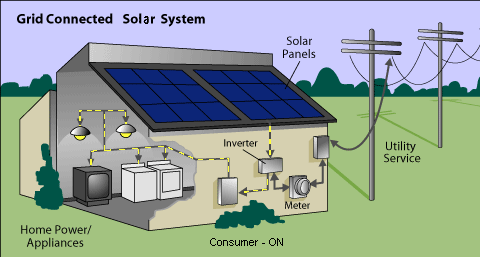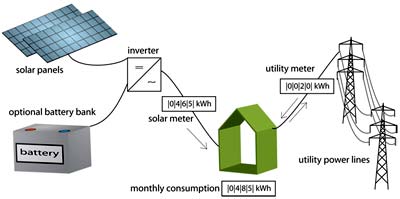Before you start ordering your systems, however, there are still some problems remaining. The draft Green Paper called for the introduction of net metering, whereby you connect your panels to the BELCO grid and turn your electricity meter backwards as you generate power. When the sun is down, your meter spins forward and you use the electricity you generated during the day. This process is already happening in more than 40 of the US states and over 40 other countries around the world.
In Bermuda, this issue has not been resolved with any clarity. Despite public statements at BELCO shareholder meetings and in the media, there has been little tangible progress. Dudley Hollis, whose solar home was featured on the Greenrock website in April 2008, was shortly afterward disconnected from the power grid. He now finds himself giving his surplus energy to BELCO for free and paying for any power he takes back from the grid. Greenrock has learned that some customers of Purenergy, a subsidiary of BELCO Holdings Limited, are being allowed to net meter ostensibly on a trial basis, and salesmen are offering ‘to hook you up’ to the grid.
statements at BELCO shareholder meetings and in the media, there has been little tangible progress. Dudley Hollis, whose solar home was featured on the Greenrock website in April 2008, was shortly afterward disconnected from the power grid. He now finds himself giving his surplus energy to BELCO for free and paying for any power he takes back from the grid. Greenrock has learned that some customers of Purenergy, a subsidiary of BELCO Holdings Limited, are being allowed to net meter ostensibly on a trial basis, and salesmen are offering ‘to hook you up’ to the grid.
This scenario is familiar if you research the history of net metering in other countries. Arguments from utilities have typically started with attempts at technical confusion, followed by safety scares, followed by threats and recourse to lawyers, and finally a grudging acceptance of small-scale energy producers. Greenrock wants to see the formation of an independent energy commission to oversee the process. This has happened elsewhere, including in other wealthy island states like Hawaii, which enabled net metering after such a process.
The challenge in Bermuda is striking a balance between all the parties concerned: Government, BELCO, consumers and renewable energy entrepreneurs. Greenrock recognises the variety of concerns that BELCO is addressing with this movement towards energy conservation and forms of renewable energy supply. As a private company, BELCO is financially accountable to its shareholders. As the only public energy utility, BELCO has a duty to be a dependable source of electricity for its customers. And as a large industrial employer, BELCO has an obligation to ensure the safety and livelihood of its staff. In addition to BELCO's concerns, the Government is trying to deregulate energy production in Bermuda; consumers want the unit cost of energy not to be tied to volatile oil prices; and local entrepreneurs want to participate in the new energy industry.
There is still a legal framework that needs to be built. An analogy might be when cars were introduced to Bermuda: we had to develop an inspection and licensing procedure. A car is a device that needs to be handled safely and maintained, just as a solar array does. BELCO has requested that they inspect solar systems themselves, but there are already well-qualified electrical inspectors at work in Bermuda inspecting new constructions and off-grid solar installations.
There has also been a request from BELCO to the Energy Minister for a process called dual metering as opposed to net metering. Under a dual-metering arrangement, two uni-directional meters are installed: one records electricity drawn from the grid and the other records excess electricity generated by solar panels and fed back to the grid. The user pays the normal retail rate for the electricity they use, and the power provider purchases the excess power they generate at its avoided cost, or wholesale rate. There may be a significant difference between the retail rate the user pays and the power provider's avoided cost, potentially making investment in a solar array difficult to justify financially.
Despite the efforts of Government, the solar industry in Bermuda might be destroyed before it really begins. As an organisation focused on sustainable development, Greenrock is trying to broker a balance between all parties and wants more of the general public to step up and be heard. We must all work together to move Bermuda in the right direction, as other forward-thinking countries are doing regarding energy consumption and pricing.

Benefits to BELCO of net metering
Even in a situation of net metering – in which the price of power generated equals the price of power sold – the utility gains by being able to keep, for no charge, any excess credits (or kilowatt hours) generated over a 12-month period. They never have to pay out to the customer. This is a win-win situation for the utility, as they get free unused electricity generated by the solar panels.
What about the traditional concerns of cost and reliability? First, utilities obtain electricity and capacity from small, distributed solar installations. This is electricity they don't have to generate themselves or purchase on the market. With solar systems, power generation takes place every day of the year with a very high correlation to utility peak loads. For example, at midday when cooling demand peaks, your panels are feeding the grid while you are at work. BELCO has been warning of brownouts this summer due to excessive air conditioner usage, and solar power suppliers could help with this problem. Utilities obtain the benefit of additional capacity in their service territory paid for by individuals.
Distributed generation also can strengthen the distribution grid, especially in areas distant from Hamilton. Voltage tends to drop at the end of long distribution lines when loads are high, and if it drops below a threshold level, the breakers will trip and a temporary blackout occurs. Solar systems connected to the distribution grid strengthen voltage and improve overall service. And this grid support can defer maintenance and upgrades in the power distribution system, which is a tangible benefit to utilities.
Safety is an important issue and high standards should be set. Over one million solar arrays are functioning safely in the USA. Equipment used in Bermuda should adhere to UL standards and be inspected by an electrical inspector. In fact, many Bermudian companies have already been ‘feeding the grid’ with no inspection by running diesel generators during the summer months on BELCO's request. According to a former BELCO electrical systems engineer with over 15 years of experience, feeding electricity back into the grid on the scale of a small solar array is already possible and safe.
Examples of other territories’ approaches to net metering
California: Under California law, the payback for surplus electricity sent to the grid must be equal to the price charged at that time. It can never be negative, meaning the customer cannot make money from selling the electricity back. If a user generates more electricity than they use over a period of a year, they are billed zero. In effect, excess electricity generated is given to the power company.
Europe: Germany and Spain, on the other hand, have adopted a price schedule, or feed-in tariff, whereby customers are paid for any electricity they generate from renewable sources on their premises. The total electricity generated is counted on a separate meter, not just the surplus fed back to the grid. In Germany, for the solar power generated, a feed-in tariff of more than three times the retail rate per kWh for residential customers is paid in order to boost solar power installation.
Colorado: There is no limit on enrolment, system size is limited to 2 MW and excess is credited to customer's next bill. The utility pays the customer at end of each calendar year for excess kWh credits at the average hourly incremental cost for that year.
Australia: Australia's feed-in tariff is actually net metering, except that it pays monthly for net generation at a higher rate than retail. In Victoria, householders are paid 60 cents for every excess kilowatt hour of energy fed back into the state electricity grid. This is around four times the current retail price for electricity. In Queensland, the Solar Bonus Scheme pays 44 cents for every excess kilowatt hour of energy fed back into the state electricity grid, around three times the current retail price.




